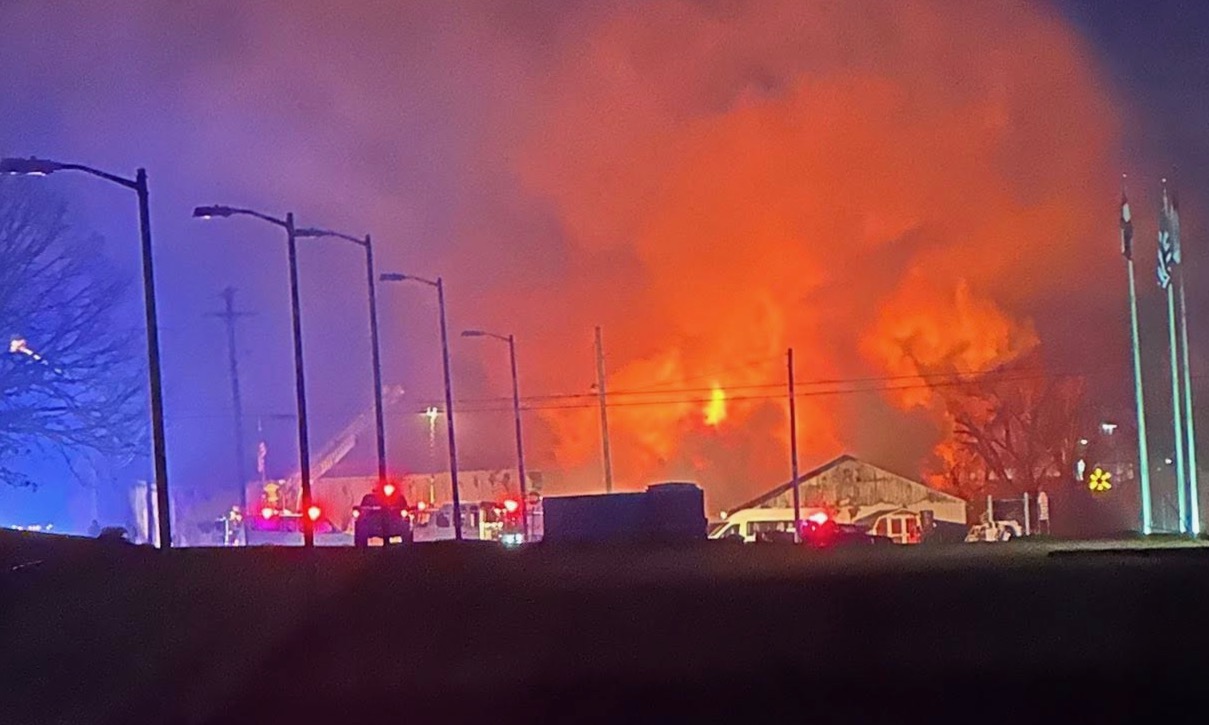Missouri special session may provide new life for $500 million budget bill

On the night of Dec. 17, a devastating fire swept through the Scenic River Industries sheltered workshop in Salem, throwing about 30 people out of work and upsetting recycling efforts in the area.
A temporary replacement was donated about a month later to the organization, which provides taxpayer-supported employment to people with developmental disabilities. But its capacity was severely reduced and its future was in serious doubt.
The building owned by the Dent County Disabilities Board was insured, but not enough to rebuild to modern standards, said Shawn Bolerjack, board chairman. And while the board receives about $280,000 a year from its tax levy, it can’t afford to divert money from its other services.
But Bolerjack was comforted when he learned help was on the way in the form of state funding.
Freshman state Rep. John Hewkin, a Republican from Cuba, and veteran state Rep. Don Mayhew, a Republican from Crocker, worked to add $2.5 million to the capital improvements budget, and the money was still in the bill when the Senate approved it the morning of May 9.
But that afternoon, Republican leaders in the Missouri House refused to bring it up for a final vote, and the money was lost.
“We were surprised and disappointed to hear that they killed the bill,” Bolerjack said in an interview with The Independent.
In all, more than 60 projects added by lawmakers, in addition to more than 20 sought by Gov. Mike Kehoe, will not be funded. The list of projects included money for eight hospitals around the state, a new nuclear reactor at the University of Missouri to make cancer treatments and a new mental health hospital in Kansas City.
Outrage over the surprise move doomed a stadium funding plan Kehoe presented to lawmakers the next week and soured relations between the House and Senate in the session’s waning days.
But for people counting on the funding to make these local projects work, the news was devastating.
Two hospitals that saw promised state money disappear, including one in Salem, were counting on the funds to keep the doors open.
Hewkin and Mayhew secured $6.8 million toward a $20 million project for roof and heating system repairs, as well as other deferred maintenance, at Salem Memorial District Hospital. Without the money, Hewkin and Mayhew said the hospital will likely close.
“I’ve been poor,” Hewkin said. “You do the best you can do with what you have, and so when you do that for so long, things eventually get to a point where it’s got to be fixed, whether we have the money or not. Salem Hospital finally just got to the point where something was going to have to be done with those kinds of systems.”
Phelps Health System, which operates out of Rolla, pledged $6.5 million to the project, Mayhew said, as part of an affiliation plan announced last year. Without the state money, Mayhew said, the affiliation plan will probably be scrapped.
“They can probably stay open for a while,” he said, “but it’s a downward spiral.”
The other hospital in danger of closing is Pemiscot Memorial Hospital in Hayti, which was in line for $1.2 million in the capital improvements budget to buy a new electronic medical records system, hospital board chair Jonna Green said.
“This money would not have simply lined our bank account,” Green said. “It would have enabled us to bill more efficiently while also reducing the chance of human error. We originally understood there was another $700,000 that was initially proposed to assist with operations, but it never made it into (the appropriation bill). We could have used it, but we were happy to receive the $1.2 million…until we didn’t.”
Both hospitals are losing money on inpatient services, according to data compiled by Saving Rural Hospitals. Pemiscot Memorial was in the black on its full range of operations, which include pharmacy services and long-term care, while Salem Memorial was not.
A new records system will mean fewer billing errors and fewer employee hours dedicated to accounting systems, Green said.
The loss of the money “won’t cause us to close, but it would in the long term,” Green said. “We can’t keep operating as we are now.”
Special session
Most of the time, the adjournment of the regular legislative session would mean waiting a year for another chance to influence the appropriation process. But Kehoe has already said he will call lawmakers back on a bill to spend state tax money on new and improved stadiums for the Kansas City Royals and Chiefs.
For those with projects in the construction funding bill, Kehoe held out the prospect of a lifeline that could get them the money this year.
“I’ve heard and listened to quite a few senators and representatives from both sides of the aisle on that very same issue, and I understand what their concerns are,” Kehoe said. “And I think it’s fair to say everything is on the table of what that special session might look like.”
For his area, Bolerjack said, the appropriation bill is more important than incentives for sports teams.
“We’re hoping Gov. Kehoe will call a special session because there are too many important capital improvement projects in this bill to keep it waiting, including the sheltered workshop in Dent County,” he said.
The path for a stadium plan could be greased by the appropriations. Kehoe revealed his proposal to divert state tax money to stadium bond payments just two days before lawmakers went home.
It won 108 votes in the Missouri House but died in a bipartisan Senate filibuster. But Kehoe shouldn’t take the House for granted in the special session, Mayhew said.
“The governor still has a pretty tall job of selling it, regardless of what the House vote came out as,” said Mayhew, who was absent during the stadium vote. “It’s a pretty hard sell in my area for a stadium and or for any money related to a stadium.”
Another chance to get the projects funded would be a sweetener that helps get the stadium plan passed, Hewkin said.
“In my heart, I feel that there’s a possibility that we haven’t visited this for the last time, and that we still have a chance,” he said. “It’s my hope that maybe we’ll be able to get (appropriations) also in that special session.”
In the Senate, Kehoe will have to navigate both those with objections to state support for any professional sports team and those who blocked his bill because the House did not vote on the capital spending bill. And, to add another layer of difficulty, the Senate adjourned in acrimony when Republican leaders invoked the rule to shut off debate, unused since 2020, to repeal a voter-approved paid sick leave law and put an abortion ban on a statewide ballot.
One of the biggest boosters of the Chiefs and Royals, Democratic state Sen. Barbara Washington of Kansas City, said when the session ended that she could not support a stadium funding bill if the capital improvements bill is not part of a special session.
“Those things are more important to me and to my colleagues than the Chiefs,” Washington said.
State Sen. Lincoln Hough, a Springfield Republican who chairs the Senate Appropriations Committee, said he’s not inclined to revisit the stadium proposal in a special session without a construction budget bill.
“I’m not saying the Chiefs aren’t important. I’ve been a pretty big proponent of saying we need to do what we need to do to keep them,” Hough said. “But unless it’s all included, there’s no point in it and we better have some assurances on the front end that the House isn’t going to do what the House did last time.”
During the filibuster, Hough said he was spurred to opposition in part after House Republican leaders said they spiked the appropriation bill because the overall budget spent too much, then enthusiastically backed a stadium proposal that will cost hundreds of millions of dollars..
“I don’t think there’s any point in calling a special session on anything, given the way this place is working or not working,” Hough said.
Rural hospital losses
According to Missouri Hospital Association data, there are 12 rural hospitals in the state that have closed since 2014, with the Center for Health Care Policy and Payment reform showing nine more at immediate risk of shutting down.
The loss of each rural hospital means miles of extra driving for life-saving emergency care after injuries or medical events like heart attack or stroke. If Pemiscot Memorial closes, the closest Missouri hospital is a 45-minute drive away in Sikeston, Green said.
“We have Petersburg and Blytheville (in Arkansas), who are, say, 30 miles away,” Green said. “But the problem with that is, they don’t really like to take Missouri Medicaid and out-of-state patients.”
Bolerjack said he is concerned about the possibility Salem Memorial will close.
“The hospital is a critical access hospital for our community and communities nearby,” he said. “It would definitely hurt us.”
The Salem hospital is an important resource when someone has an emergency while visiting tourist sites such as the Ozark Scenic Riverways, Mayhew said. There is a helipad at Akers Ferry Access, and a ground transport can be done in under 30 minutes.
“Without Salem Hospital, you’re probably a two hour ride in an ambulance,” Mayhew said.
The six other hospital projects cost a total of $12 million. They are in Clinton, Butler, Milan, Memphis, St. Joseph and Louisiana.
The bill had major state projects that were important for Kehoe as well. There was $50 million to support the University of Missouri’s project to build a new research reactor and $55 million for a new livestock display and stalling barn at the Missouri State Fairgrounds.
But it’s the small items that members were ready to showcase as examples of their ability to get things done in Jefferson City that mean the most to individual lawmakers.
“Anytime there’s cuts and things like that, sometimes it’s your ox that gets gored,” Hewkin said. “Most people don’t mind cuts, as long as it’s not their program.”
Hewkin said he has learned a lesson regardless of how the special session goes.
While the items included in the construction budget died, 248 more legislative earmarks, costing $418 million of general revenue and $550 million overall, found a home in the $53.1 billion in spending that was approved.
So while he lost the money for Scenic River Industries, state Senate President Pro Tem Cindy O’Laughlin secured a $2 million grant for Handi-Shop Inc., the sheltered workshop serving Mexico in Audrain County.
That money was inserted into the Department of Education operating budget, which also includes $32 million for operating grants to the almost 90 Missouri sheltered workshops. There is $45 million in direct grants to hospitals and health care centers in the Department of Social Services budget.
“I’m hoping in my heart that there’s a chance that we still get a chance to get some of that done this year in a special session,” Hewkin said. “But if not, then next year, I’ll be standing at the appropriations door very early and asking to get my appropriation in there so we can take care of those people.”
YOU MAKE OUR WORK POSSIBLE.
Missouri Independent is part of States Newsroom, a nonprofit news network supported by grants and a coalition of donors as a 501c(3) public charity. Missouri Independent maintains editorial independence. Contact Editor Jason Hancock for questions: info@missouriindependent.com.
Miss Clipping Out Stories to Save for Later?
Click the Purchase Story button below to order a print of this story. We will print it for you on matte photo paper to keep forever.

